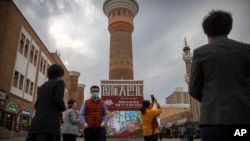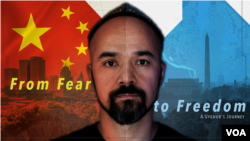Nearly half of the 44 journalists imprisoned in China in 2023 were Uyghurs, according to a report released Thursday.
Data from the Committee to Protect Journalists, or CPJ — which offered a global snapshot of journalists jailed for their work as of December 1 — found China had the most media workers imprisoned.
The high proportion of Uyghurs detained in the country highlights the intersection between Beijing’s poor press freedom record and its human rights abuses against the majority-Muslim ethnic group, analysts said.
An examination of the cases of the 19 Uyghurs held showed that critics of the Chinese government often face charges of separatism and terrorism.
The academic and blogger Ilham Tohti, for instance, this week marked 10 years in custody. The scholar, who was arrested in January 2014, is serving a life sentence for so-called separatism.
In jailing him, a court cited his interviews with foreign news outlets and his work as the founder of the Xinjiang news site Uighurbiz, which authorities shuttered in 2014.
“For the Chinese government, Uyghur journalists are a dangerous group of people. They don’t want them to say anything,” said Zubayra Shamseden, who works at the Uyghur Human Rights Project, or UHRP, in Washington.
“They [Beijing] try to crack down on Uyghur journalists particularly because they want to shut the Uyghur voice off,” Shamseden told VOA.
Multiple governments, including that of the United States, have accused China of committing genocide against Uyghurs and other ethnic groups in the northwestern region of Xinjiang. The U.N. Human Rights Office has warned that Beijing may be perpetrating crimes against humanity against Uyghurs.
Beijing denies any wrongdoing in Xinjiang, which some Uyghurs prefer to call the Uyghur Region or East Turkistan.
Silencing critical reporters is often the goal behind journalist arrests, according to CPJ Chief Executive Jodie Ginsberg.
That tactic is seen across the global data CPJ collected on jailed journalists, with 320 held around the world.
“The message is clear. Journalists hold the powerful to account,” Ginsberg told VOA. “And those in power often find that incredibly threatening.”
Three out of the five new China cases in CPJ’s 2023 database were of reporters accused of espionage, inciting separatism or subverting state power.
“Particularly in authoritarian regimes, we see this use of the law — or misuse of the law — to detain and silence journalists. And that’s exactly what it’s intended to do. It’s intended to silence critical voices,” Ginsberg said.
The targeting of Uyghur reporters and bloggers parallels the persecution of other Uyghur intellectuals and cultural figures in Xinjiang.
Over 300 Uyghur and other Turkic Muslim intellectual and cultural elites have been detained in the region, according to a 2021 report by UHRP.
“As a component of genocide, the assault on intellectual and cultural elites may constitute a new form of ‘eliticide’ meant to exterminate Uyghur (and other) cultural identity,” the UHRP report said.
Even abroad, Uyghurs — especially journalists and activists — find themselves and their close relatives harassed or intimidated in a process known as transnational repression.
“For Uyghur journalists, whether they are inside China, inside East Turkistan or outside of China, it doesn’t matter,” Shamseden said. “They [Beijing] try to put pressure on them so they don’t speak out, so they don’t disclose all the information that China doesn’t want the world to know.”
CPJ’s Ginsberg said the Chinese government “has shown remarkable inflexibility in responding to allegations of human rights abuses.”
In response to VOA’s email requesting comment, a spokesperson at the Chinese Embassy in Washington rejected reports that Beijing does not respect media freedom.
“The Chinese government protects press freedom in accordance with law, and gives full play to the role of media and citizens in supervising public opinion,” the spokesperson said.
The spokesperson said that some in the U.S. “smear and attack China,” which, the person said, “in itself is spreading disinformation.”
Hong Kong case
Hong Kong authorities have also pushed back at Western criticism of the trial of pro-democracy publisher Jimmy Lai.
The founder of the now-shuttered Apple Daily newspaper is currently standing trial in Hong Kong under the National Security Law that China introduced in 2020.
Many view Lai’s case as emblematic of the rapid decline in press freedom and broader civil liberties in Hong Kong.
“Jimmy Lai’s case is an incredibly powerful and important test of Hong Kong’s commitment to a free press,” Ginsberg said. “It’s really, really important that we see the international community speak out in support of Jimmy Lai, in support of a free press.”
Lai, a British national, is accused of “collusion with foreign forces” under the National Security Law and sedition. If convicted, he faces up to life in prison.
Western governments and human rights groups have called for the 76-year-old’s immediate release.
Lai’s case highlights how the Chinese government tends to use national security charges to target journalists, a trend that is mirrored globally.
That tactic was used to target Australian journalist Cheng Lei. A former anchor at the Chinese state-run TV channel CGTN, Cheng was detained in Beijing in 2020.
The reporter was later accused of “illegally supplying state secrets overseas,” and a closed-door national security trial took place in 2022.
Cheng was released from prison and deported to Australia in October 2023. She said she was jailed for breaking an embargo by just a few minutes.
In an interview with VOA’s Mandarin Service, Cheng said despite China’s economic growth, press freedom has only regressed.
“When you are able to think enough to analyze things, to read, to change yourself, to help others, you are free,” she said. “I have a new appreciation for freedom.”












